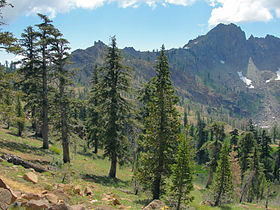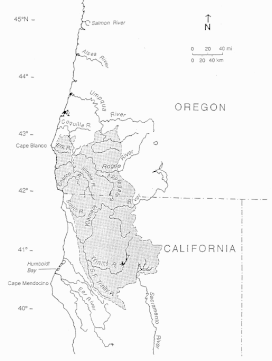Klamath Range
| Klamath Mountains | |
|---|---|

Mixed conifer forest in the Trinity Alps
|
|
| Highest point | |
| Peak | Mount Eddy |
| Elevation | 9,025 ft (2,751 m) |
| Dimensions | |
| Length | 249 km (155 mi) |
| Width | 181 km (112 mi) |
| Area | 25,595 km2 (9,882 sq mi) |
| Geography | |
| Country | United States |
| States | Oregon and California |
| Range coordinates | 41°19′N 122°29′W / 41.32°N 122.48°WCoordinates: 41°19′N 122°29′W / 41.32°N 122.48°W |
The Klamath Mountains are a rugged and lightly populated series of mountain ranges in northwestern California and southwestern Oregon in the western United States. They have a varied geology, with substantial areas of serpentinite and marble, and a climate characterized by moderately cold winters with very heavy snowfall and warm, very dry summers with limited rainfall, especially in the south. As a consequence of the geology and soil types, the mountains harbor several endemic or near-endemic trees, forming one of the largest collections of conifers in the world. The mountains are also home to a diverse array of fish and animal species, including black bears, large cats, owls, eagles, and many species of salmon. Millions of acres in the mountains are managed by the United States Forest Service.
Physiographically, the Klamath Mountains include the Siskiyou Mountains, the Marble Mountains, the Scott Mountains, the Trinity Mountains, the Trinity Alps, the Salmon Mountains, and the northern Yolla-Bolly Mountains. They are a section of the larger Pacific Border province, which in turn is part of the Pacific Mountain System (Pacific Coast Ranges) physiographic division.
The three highest peaks in the Klamaths are Mount Eddy in Siskiyou County, California, at 9,025 feet (2,751 m), and Thompson Peak and Mount Hilton in Trinity County, California, at 9,001 feet (2,744 m) and 8,934 feet (2,723 m), respectively. The northernmost and largest sub-range of the Klamath Mountains are the Siskiyou Mountains.
...
Wikipedia

